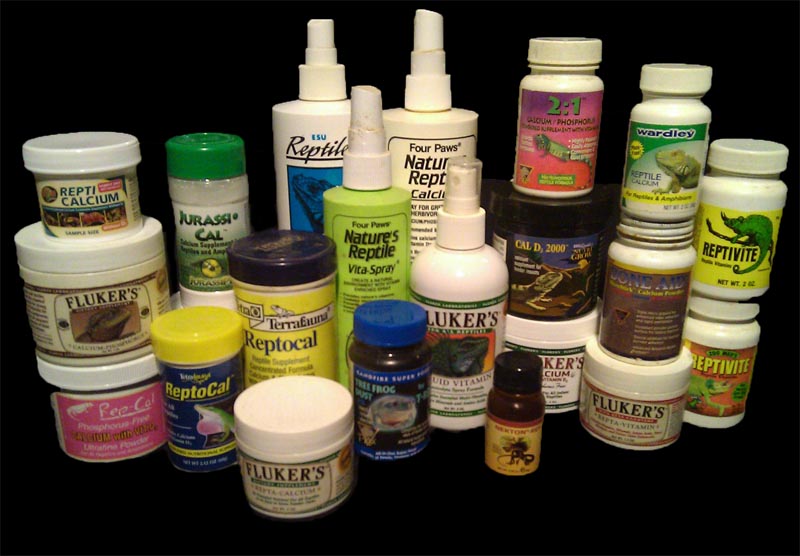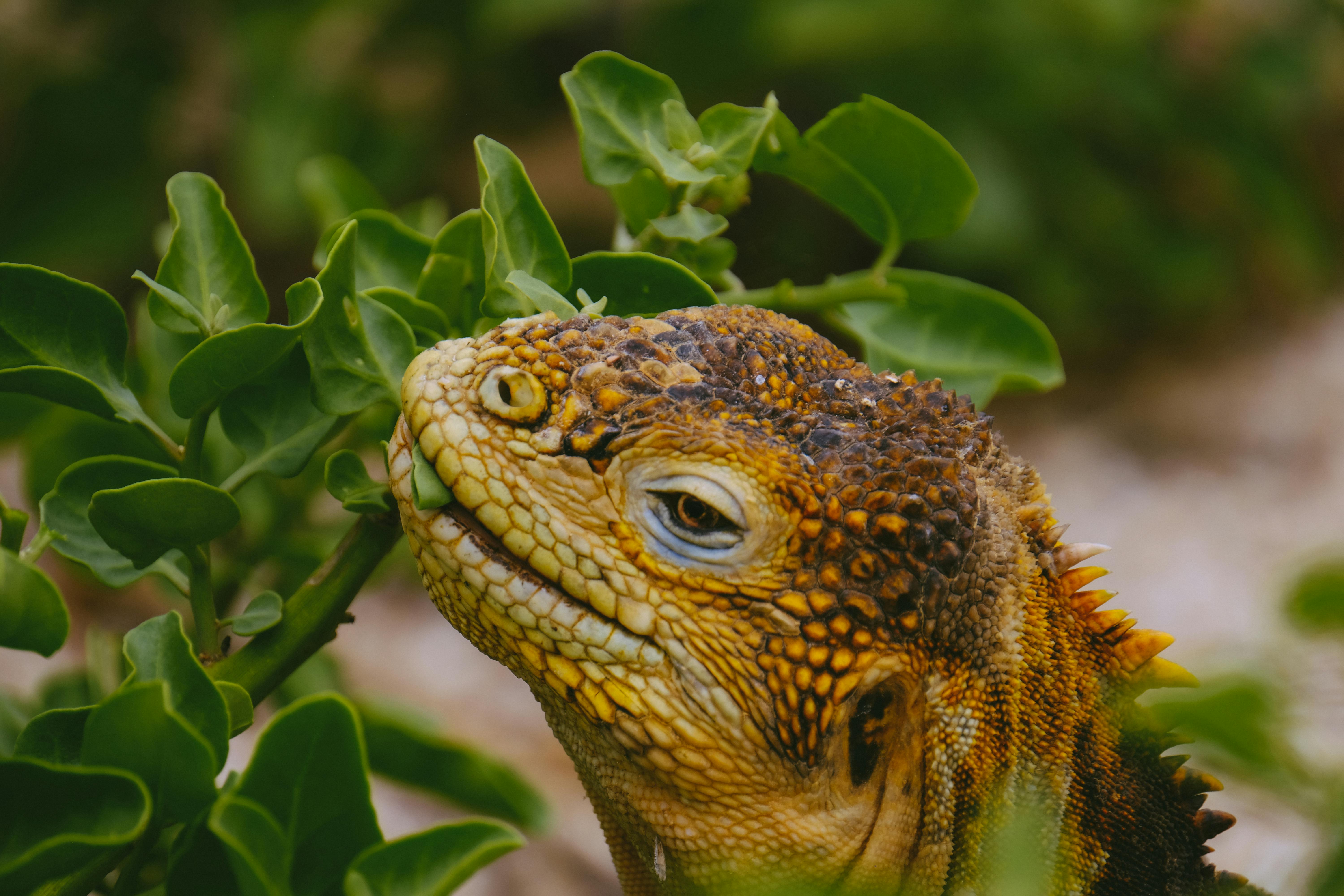Nutritional Supplements

If there ever was a headache in providing proper care for your reptile, it's trying to figure out what
kind of supplement you should use. There seems to be a never-ending line of new products containing
vitamins, calcium, some with vitamin D3, some without, calcium with no D3 but phosphorous, and then of
course phosphorous-free products... you get the idea. To make matters worse, a lot of the product
packaging looks very similar. Compounding the problem even further, many of these companies do not
provide any nutritional analysis on the label at all, and those that do use varying measurements and
units making it difficult to determine what you are actually getting. And the icing on the cake... no
one really knows what any of these reptiles actually needs regarding dietary and nutritional
requirements.
One thing we noticed in our research is that almost every pet product retailer and manufacturer has an
entire section of their website dedicated to nutritional supplements. In other words, this is big
money. Big money means companies will sell just about anything, and not all companies are forthcoming
about what they are selling. Sometimes they will tell you that you need things you don't... because
you will buy it. Sometimes what they say is in the bottle is not what you get out.
Not all supplements and companies are bad, and while we don't know exactly what nutritional
requirements a given species might need, it is obvious vitamin and mineral supplementation is
necessary in many cases due to the limited diets in captivity.
We cannot tell you what a good product is for your pet. Nutritional requirements of species varies
greatly, and requirements differ for young reptiles than for geriatric animals. Likewise, diet and
health conditions can greatly affect the proper supplementation you will need for your particular
animal. We can help you make sense of what is in the supplements that are available on the market, but
it is up to you to do your homework and research on your specific pet's needs. We highly recommend you
consult your veterinarian before selecting a nutritional vitamin or mineral supplement for your pet
reptile.
Two Great Resources for the Management and Husbandry of Reptiles:
There are many conflicting reports about vitamin D3 and phosphorous in dietary supplements. To
maintain a specific Calcium:Phosphorous ratio, check your diet in the nutrition charts above to see
how much you are getting depending on what you feed to determine what still needs to be added to get
your pet where you want be. You will find a lot of information out there about your particular
reptile's needs. Some of it is good and a lot of it is bad. There are differing opinions about proper
Calcium:Phosphorous ratios, and how much if any should be supplemented, in what proportion, and how
often. Likewise, there is a lot of debate about whether reptiles can even process Vitamin D3 taken
orally as many reptiles process it internally via direct UV light from the sun. Not supplementing a
deficient diet leads to vitamin and mineral deficiencies and metabolic problems. Over supplementing
with the wrong vitamins and minerals can lead to things like hypervitaminosis, hypercalcemia, and
metabolic problems. So tread carefully, read a lot of information, and try to make a good informed
decision. And consult your vet!
Our word of caution is be careful not to overdo the supplements. Serious health issues can result from
an imbalance of vitamins and minerals, including death, and improper use of these products can make
that happen. In a perfect world, our pets would get everything they need in a good diet and not
require anything additional. If you have absolutely no idea what is the correct kind of supplement to
give your pet, it is probably better to not give any of these supplements than to give the wrong one.
Again, ASK YOUR VET FIRST. Do not blindly grab any product off the store shelf and assume it is OK for
your animal. We can't provide all these answers as we don't know and are just as confused as everyone
else. We try to feed a well balanced, nutritious diet to begin with and go less on the
supplementation.
What we have done for you is compile a comparison chart of common reptile supplements for you to be
able to compare products and their guaranteed nutritional analysis on an even level. Some
manufacturers report only a guaranteed analysis in a percentage, others provided measurements in units
per kilogram, a few did not even provide units of measurement, and yet others gave figures in units
per pound. Many manufacturers do not list any ingredients or give any nutritional analysis at all.
Often manufacturers gave only a minimum, or a maximum, and sometimes a range. Problem is, if a product
has a guaranteed 30% calcium minimum, does that mean our lizard might be getting 75% calcium?
Likewise, a 30% calcium maximum on the label does not mean the reptile is getting 30% calcium. It
might only be getting 10%. Unfortunately there is no FDA for pet products, and quite simply
manufacturers can list anything they want on the label, even if not accurate, without repurcussions.
While the label might say the product has phosphorous, it could have little or none at all. A product
that supposedly has a 2:1 Calcium:phosphorous ratio might actually have 5:2. There is simply no way to
know, and no standards in place to ensure even distribution of vitamins and minerals in a given
product.
Many companies also change packaging, product names, and formula often, adding to the confusion
between products. An example is we found an online national pet chain currently selling a product
called Exo-Terra "Calcimize" but we could not find the same product on Exo-Terra's website. Another
example is that we have numerous multiple containers of the same supplements but with different colors
on the label, different names, new formulas, etc. Some companies don't even disclose what they are
selling or what is in the product. We tried to identify the ingredients and nutritional analysis of
two different vitamin supplements manufactured by Four Paws. Neither bottle has any ingredients, any
nutritional content or data, and their website does not even have a link to any reptile products, only
dog and cat. Who knows what is in those bottles marked only "Reptile Vitamins"? Likewise, ESU Reptile
does not seem to have a website or anywhere customers can find information about their products.
Several products from a number of companies are nothing more than crushed sea shells, or pure calcium
carbonate. That's some expensive sea shells.
None of this is helpful to the pet owner trying to determine what is in there and what their pet is
getting. We hope our chart helps with this by comparing some of these products on an even ground. We
only compared vitamin and mineral powder supplements and did not look at vitamin sprays (mostly
water), gut load, recovery formula, or flavor enhancers. Besides converting all the manufacturer's
values to the same units for comparison, we also reduced the analysis to the gram level. Manufacturers
often provide this data in units per pound or units per kilogram. Since we don't give our reptiles a
pound of supplement, this doesn't really do any good. We used a gram as this seemed to be a common
recommended dosage by the manufacturers, although we feel ONE GRAM OF MOST OF THESE POWDERS IS WAY TOO
MUCH at any one time for small reptiles. Be advised that Arrowhead Reptile Rescue is not promoting nor
discouraging your purchase or use of any particular product or company.
So now that you can compare the actual contents of these products in a meaningful way, let's look at
exactly who is making some of these products. Some companies go to great lengths to hide who they
really are. Others provide little or no details to the public about their operations or research. Many
of the manufacturers claim to have completed vast reptile nutritional studies, years of research, with
scores of scientists working on it. Some may have. However, we did not find any manufacturers website
that actually had published any research studies or data in support. In fact, we were unable to find
any information on any of these products outside of what was provided as a nutritional analysis on the
label or the company website. In the best interest of knowing who is making your reptile's
supplements, and who their parent companies are, here is what we found:

Internet records show
Rep-Cal is located in San Jose, CA. The company was founded in 1988 as the Orup Company. They manufacture and sell a number of reptile items.

Another reptile only company,
T-Rex, appears to be a small company started in Crawfordsville, IN, located in Chula Vista, CA in 1997.

Focused on reptiles but also selling other pet products is
Zoo Med, which started as a small company in Costa Mesa, CA 1984.

Sticky Tongue Farms is a small family owned business started in 1992 located in Sun City, CA. They also specialize in reptile products.

Jurassipet is a subsidiary of
Seachem laboratories, founded in the 1980's with focus on marine and aquarium fish products.

Fluker Farms started in 1953 providing crickets and insects. After marketing gut load for insects for many years, they have expanded out into the reptile nutrition market with several products.a

A popular reptile name,
Exo-Terra is a subsidiary of global pet products manufacturer Hagen founded in Montreal Canada, 1955.

Mostly a world-wide supplier of fish products,
Tetra Fish began in Germany in 1950 and makes a number of reptile products including
the most popular turtle stick diet.

Another giant pet product company is the makers of
Wardley fish and reptile products,
Hartz Mountain Industries, around since 1932.

Not as well known in name but equally large is
Central Garden & Pets, owners of not only brands like kaytee, zodiac, and oceanic, but also
Zilla and
ESU Reptile.




